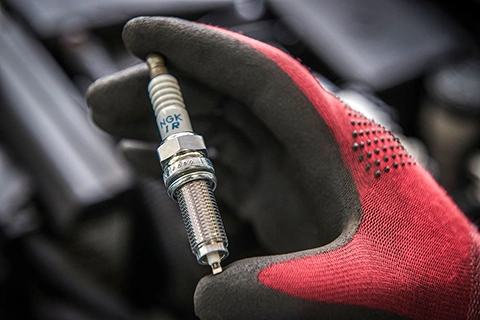You asked Google & NGK SPARK PLUG answers! – Part 4: Ignition coils, leads & caps

1. What does an ignition coil do?
Ignition coils provide the spark plug with the high voltage required to generate a spark. The ignition coil is an induction coil that transforms the battery's low voltage to the high voltage that is needed to create an electric spark in the plugs and ignite the petrol. NGK ignition coils are accurately engineered for a precise fit (correct seating), superior vibration resilience, exceptional short-circuit and moisture resistance, and long-lasting durability.
2. What are the signs of a bad ignition coil?
Symptoms of a bad or failing ignition coil include engine misfiring, rough idle, a reduction in power and even a complete failure to start the vehicle. In such cases, the ‘check engine light’ on the dashboard will be activated.
3. How many different types of ignition coils are there?
NGK SPARK PLUG offers six different types of ignition coils. These are: Distributor Coils, Block Coils, Block Coils with two high voltage outputs, Pencil Coils with double spark and single spark technology and Coil Systems (also known as ‘rails’).

4. Does NGK SPARK PLUG make good ignition coils?
Ignition coils are part of the company’s NGK Ignition Parts automotive brand portfolio, meeting the same high standards as all of the other products available from NGK SPARK PLUG. As the world's leading ignition specialist, the company offers an extensive selection of ignition coils to the Aftermarket, which deliver OE equivalent quality as well as the highest durability and operational performance. Almost 400 high performance part numbers are available, covering 92% of vehicles operating in Europe.
5. What is an ignition lead?
Also known as an ignition cable, ignition leads (which consist of an ignition wire and connector) link the ignition coils to the spark plugs. Ignition leads form part of one of the four product lines offered within the NGK Ignition Parts brand. Thanks to NGK SPARK PLUG's competence in the field of ignition technology, the company is able to offer ignition leads and connectors in the Aftermarket that are OE equivalent quality and ideally complement its wide range of spark plugs and ignition coils.
6. How many different types of ignition leads are there?
There are three different types of ignition leads: Copper Core Ignition Leads with an interference suppression resistor (in the connectors), Carbon Ignition Leads with active resistance, and Fibreglass Ignition Leads with an inductive resistor. These types differ based on the materials used for the conductor and the type of resistor required for interference suppression. It is important to choose the correct technology for any specific engine, leading to the ideal performance of the ignition system. The company’s ignition leads meet the OE standards of car manufacturers.
7. Do NGK ignition leads make a difference?
NGK ignition leads guarantee outstanding insulation, a high level of resistance of up to 200°C and resistance to vibrations and fluctuations in temperature and humidity. Choosing the brand’s ignition leads secures permanent reliability under extreme conditions, even over an extended period of time.
8. What role do caps play?
Caps are mainly required for motorcycles, scooters, small engines and marine applications. They are used to connect each spark plug to a high tension (HT) ignition lead; typically by screwing them onto the end of the cable. Occasionally, caps can be applied to 4-wheel vehicles as well, in which case they are usually pre-assembled. The caps feature a resistance element made of a high-quality ceramic material. This ensures a constant resistance, with small deviations in case of overload. The housing is made of phenolic resin with extremely high heat resistance and tensile strength. Special rubber bushings at both ends prevent electrical losses due to moisture.
9. Is there a difference between NGK caps and resistor caps?
Caps, both with and without resistance, are available in NGK SPARK PLUG’s product range. The resistances vary between 1-10 kiloohms (kOhm), filtering the electromagnetic interferences. To choose the correct application, it is necessary to check the part that needs to be replaced and then change accordingly.
Part 5: Everything you need to know about our oxygen sensors!
 Niterra Blogs
Niterra Blogs

Latest Articles
Behind the scenes at the x-raid rally team - February 2023



